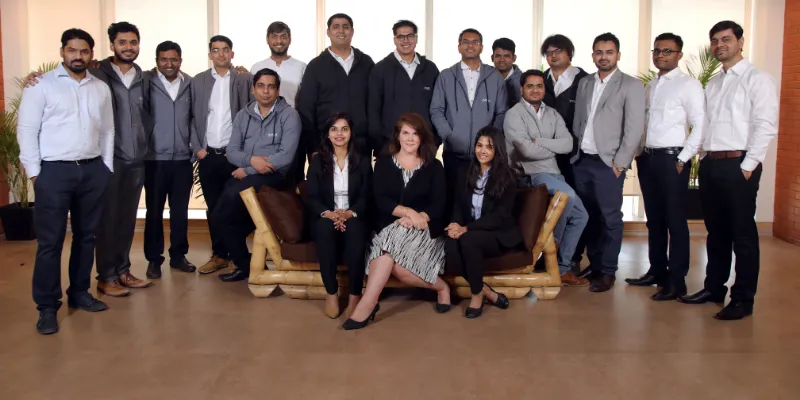This fintech startup incubated by Comviva is simplifying financial access to the un-banked
Yabx, the startup incubated by Comviva, which is part of the Mahindra Group has created financial behavioural models based on AI and machine learning, which can be used by financial institutions to provide credit for underserved segments of the population
Multinational companies (MNCs) and business conglomerates are always keen to engage with startups to seek out their innovative or disruptive solutions. In this process, there are also instances where such new companies are successfully incubated by these large organisations.
One such company is Yabx, a two-year-old business to business (B2B) startup, founded by Rajat Dayal. The startup is part of the $21 billion Mahindra Group operating in the financial services space with successful engagements in multiple countries.
The fintech startup aims to simplify financial access to the un-banked in emerging markets such as Africa, Asia, and Latin America using mobile phones.

The team of Yabx
Yabx was incubated in December 2017 within Comviva, a company which provides technology solution and services focused on the mobile operators and banks.
Given the rich experience and wide reach of Comviva in the telecom and banking sectors, it became almost natural for the company to look for newer growth opportunities, where technology could be leveraged for innovative use cases.
Big goals
“Our mandate was to solve for bigger global issues,” says Rajat Dayal, Founder & CEO of Yabx, which got funded by Comviva, but operates as an independent entity.
The area of opportunity was in the financial services sector and Yabx was in the sweet spot where it could meaningfully connect between the telecom operators, payment service providers, and banks to reach out to consumers who were still underserved in terms of credit access.
Rajat explains, globally, it is witnessed that only between five percent to 15 percent of the population, both consumers and small and medium business of any developing country gets access to bank credit, but the mobile phone penetration is over 85 percent.
“The reason for people not getting access to credit is because banks do not have information to whom they could lend. They just did not have the data,” says Rajat.
He further says there are two key parameters that banks look into before they provide credit to people – their ability to pay and intent to pay.
“The question was whether we could derive at these behavioural attributes looking into alternate data sources,” remarks Rajat.
Behavioural models
This led to a journey where Yabx envisioned creating new financial behavioural models, which will be based on artificial intelligence and machine learning. Here, the one vantage point which the startup had was access to data, especially from the telecom operators and wallet providers, given the heritage and business of parent company – Comviva.
According to Rajat, the key focus for telecom operators was finding additional revenue sources through monetisation route of their existing data while ensuring complete data privacy and security.
“For the same, we have managed to establish this level of deep trust and confidence with these operators and have signed contracts with nine players across three continents,” he says.
Yabx also did not restrict itself to just telecom data as it sourced other information from things like payment gateways, point of sale (PoS) and government data, etc.
Given this wealth of information, the startup went about creating the behavioural models, which it could provide to the banks to identify good quality borrowers. This also opened a totally new world of customers for the banks as they were reaching out to those segments of the population which normally would not traditionally be their key target segment.
“This is not an easy problem to solve, and for that you need a rockstar team. At Yabx, we have black belt people who come from backgrounds such as banking, analytics, and telecom. We have partnered with academics and machine learning experts like Dr Nuria Oliver (MIT Media Lab) to help improve the performance of our models,” says Rajat.
Tech edge
Yabx has leveraged its deep domain capabilities in areas such as big data and machine learning to create models, which banks can use to make their credit decisions. Currently, it has created models in four areas: micro and small consumer loans; agent loans, which provide quick and unsecured working capital loans for mobile money agents; handset loans for the purchase of new phones; and airtime credit, which is all about recharge services.
“We collaborate with the banks so they are able to reach out to the customers in the lower value chain,” says Rajat.
Today, Yabx is live in two places in Africa – Malawi and Rwanda. It has signed agreements in other countries such as Tanzania and Uganda. Also Bangladesh in Asia and Colombia in Latin America.
“Our typical check boxes are those countries which have a large underserved population, has presence of digital wallets, and merchant aggregators,” says Rajat.
“At the same time, we take the issue of data privacy and security as a key priority. No personally identifiable information (PII) about the borrower is shared with the financial service providers,” adds Rajat
Business model and plans ahead
The business model of Yabx is where it gets paid by the banks for the usage of its analytical model and shares part of this revenue with the telecom operators.
Rajat believes the differentiating factor of Yabx is its ability to access and analyse data to create different kinds of behavioural model that enable financial access for the underserved population.
Yabx is now planning to go live in three countries, which will primarily be in Africa and Latin America. “We have a busy funnel right now and are extremely focused to deliver value to banks who are our prime customers. In addition, telecom operators have trusted us with the ability to rank and score their end customers,” says Rajat.
Yabx has still not launched its operations in India, but is planning to go live in the next 12-15 months.
The technology led innovations at Yabx will continue as it is working on creating models on how one can control defaults in the business of lending and also coming out with financial literacy products.
(Edited by Megha Reddy)









